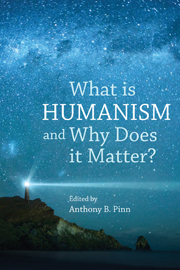Book contents
- Frontmatter
- Contents
- Preface
- Acknowledgments
- Part I What Is Humanism?
- Part II Why Doest Humanism Matter?
- 4 If War Is Not the Answer: An Altermodern Approach to Political Engagement
- 5 Humanist Outlaws: Thinking Religion/Living Humanism
- Part III What Do We Do With Humanism?
- Appendix: Humanist Manifestos
- Notes
- Select Bibliography
- Contributors
- Index
4 - If War Is Not the Answer: An Altermodern Approach to Political Engagement
from Part II - Why Doest Humanism Matter?
- Frontmatter
- Contents
- Preface
- Acknowledgments
- Part I What Is Humanism?
- Part II Why Doest Humanism Matter?
- 4 If War Is Not the Answer: An Altermodern Approach to Political Engagement
- 5 Humanist Outlaws: Thinking Religion/Living Humanism
- Part III What Do We Do With Humanism?
- Appendix: Humanist Manifestos
- Notes
- Select Bibliography
- Contributors
- Index
Summary
Political engagement is an arena that could benefit greatly from humanist sensibilities and a humanist posture toward the world. Mindful of this, in what follows, I provide some attention to how humanism as an approach to ethics might serve to enhance the life options of communities.
In the spring of 2005, former US ambassador Jonathan Dean spoke to a gathering of international peace activists in Cuenca, Spain about the work of Global Action to Prevent War. He addressed our hopes for peace, our aversion to war, and our commitment to respond to crimes against humanity with foresight and creativity. He grounded his proposals in a shift begun in the late nineteenth century within the European peace societies. Rather than expecting or seeking a fundamental change in human nature, Dean claimed that “the peace societies ultimately gave priority to mechanisms and measures to constrain war over intellectual [and moral] arguments to end war.” This turn to a constructive realism is absent in much of the peace movement today in the United States, and yet, such a stance might have great potential for implementing our proposals for enduring peace and sustainable security.
CONTEXT CONSIDERED
A humanist approach to social ethics and public policy that follows the guidelines of Ambassador Dean echoes many insights of President Obama's Nobel Peace Prize speech without, however, relying on a contrast between the “isness” of the human condition with an eternal “oughtness” that forever confronts us.
- Type
- Chapter
- Information
- What is Humanism, and Why Does it Matter? , pp. 60 - 76Publisher: Acumen PublishingPrint publication year: 2013

